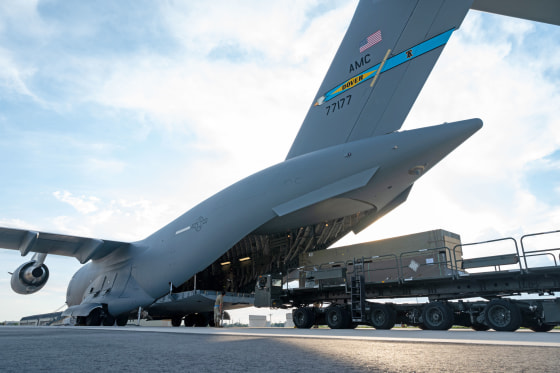
The bill includes a four-month extension of Section 702, a controversial surveillance authority, giving lawmakers more time to either reform or keep the program.

Weapons bound for Ukraine are loaded onto a C-17 Globemaster III at Dover Air Force Base, Delaware, on Aug. 19, 2022. Airman 1st Class Cydney Lee / U.S. Air Force
Dec. 14, 2023, 4:37 PM UTC / Source : Reuters By ReutersWASHINGTON — More than two-thirds of the U.S. House of Representatives voted in favor of a defense policy bill on Thursday that includes a record $886 billion in annual military spending and authorizes policies such as aid for Ukraine and push back against China in the Indo-Pacific.
The House backed the National Defense Authorization Act, or NDAA, by 310 to 118, with strong support from Republicans and Democrats. It was more than the two-thirds majority required to pass the measure and send it to the White House for President Joe Biden to sign into law.
Separate from the appropriations bills that set government spending levels, the NDAA authorizes everything from pay raises for troops — this year’s will be 5.2% — to purchases of ships, ammunition and aircraft.
Because it is one of the few major pieces of legislation that becomes law every year, members of Congress use it as a vehicle for a wide range of initiatives. It is also closely watched by major defense companies, such as Lockheed Martin, RTX Corp and other firms that receive Department of Defense contracts.
The vote for this year’s bill, which is nearly 3,100 pages long and authorizes a record $886 billion, up 3% from last year, meant that Congress has passed an NDAA for 63 straight years.
The final version of the NDAA left out provisions addressing divisive social issues, such as access to abortion and treatment of transgender service members, that had been included in the version passed by the Republican-majority House over the objections of Democrats, threatening to derail the legislation.
The Democratic-controlled Senate backed the NDAA, also with a strong bipartisan majority — 87 to 13 — on Wednesday.
The fiscal 2024 NDAA also includes a four-month extension of a disputed domestic surveillance authority, giving lawmakers more time to either reform or keep the program, known as Section 702 of the Foreign Intelligence Surveillance Act (FISA).
That provision faced objections in both the Senate and House, but not enough to derail the bill. The Senate defeated an attempt to remove the FISA extension from the NDAA on Wednesday before voting to pass the defense measure.
The House and Senate had each passed their own versions of the NDAA earlier this year. The measure approved this week was a compromise between the two parties and two chambers.
The bill extends one measure to help Ukraine, the Ukraine Security Assistance Initiative, through the end of 2026, authorizing $300 million for the program in the fiscal year ending Sept. 30, 2024, and the next one.
However, that figure is a tiny compared to the $61 billion in assistance for Ukraine Biden has asked Congress to approve to help Kyiv as it battles a Russian invasion that began in February 2022.
That emergency spending request is bogged down in Congress, as Republicans have refused to approve assistance for Ukraine without Democrats agreeing to a significant toughening of immigration law.
Ukrainian President Volodymyr Zelenskiy met with lawmakers at the Capitol on Tuesday to make his case for the funding requested by Biden, but emerged from the meetings without Republican commitments.